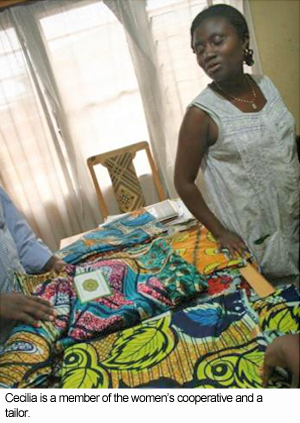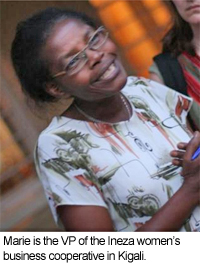We Don’t Plan On Dying; Now We Plan For Living
This guest post was written by Elly Kaganzi of CHF International following a site visit of the GROOVE Learning Network members to Ineza Cooperative, which is supported by CHF through a USAID program. The GROOVE Network members are currently in Rwanda to kick off a nine month mentorship program to improve staff capacity for Value Chain development implementation in different contexts.

“We don’t plan on dying; now we plan for living.”
For the 27 women and one man now working at the Ineza women’s business cooperative in Kigali, Rwanda, this is their new mantra. The cooperative was formed by a loose knit group of destitute, HIV-positive mothers who met at a nearby health clinic where they would come regularly to receive anti-retro-viral (ARTs) treatment. The clinic is one of the services provided by the Women's Equity in Access to Care & Treatment (WE-ACT), a Rwandan NGO that is supported by USAID’s Higa Ubeho program. Higa Ubeho is run by a consortium of 3 international NGOs and 16 Rwandan partner organizations and led by CHF International.
Before launching Ineza, these women were struggling to cover their basic expenses—food, shelter, school fees for their children, HIV drugs. With no alternatives in sight and no clear way to earn a stable income for themselves and their children, many of the women had resorted to begging for money in the streets. With the support of WE-ACT, some of the women made a group and went through a comprehensive cooperative development regimen through which they learned about establishing, managing and running a formal business cooperative, which they named Ineza—or “to be loved” in Kinya Rwandan. The women create a broad range of both traditional and modern handicrafts—from handmade cotton dolls to quilted laptop backpacks, all with traditional Rwandan print fabrics.
 “Many of the women in our group were older, so it was a challenge teaching them a new trade,” says Marie Bahizi, the cooperative’s vice president. “But now most are settled and we enjoy coming up with new designs that our customers will want to buy.” Sometimes they go to the stores in town and look at the latest styles or speak to the visitors who come to their small shop to see them work and buy their products. Ineza is now registered as a formal cooperative with the Rwanda government and is providing a regular income for its members. From luggage tags and men’s ties, to butterfly-shaped back packs for children and the latest version of the “hobo” bag for ladies, the women of Ineza Cooperative cannot stop smiling as Marie proudly tells a group of visitors: “We used to plan on dying; now we plan for living.”
“Many of the women in our group were older, so it was a challenge teaching them a new trade,” says Marie Bahizi, the cooperative’s vice president. “But now most are settled and we enjoy coming up with new designs that our customers will want to buy.” Sometimes they go to the stores in town and look at the latest styles or speak to the visitors who come to their small shop to see them work and buy their products. Ineza is now registered as a formal cooperative with the Rwanda government and is providing a regular income for its members. From luggage tags and men’s ties, to butterfly-shaped back packs for children and the latest version of the “hobo” bag for ladies, the women of Ineza Cooperative cannot stop smiling as Marie proudly tells a group of visitors: “We used to plan on dying; now we plan for living.”


